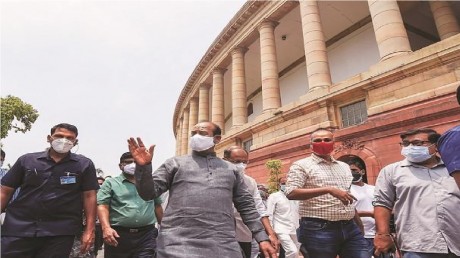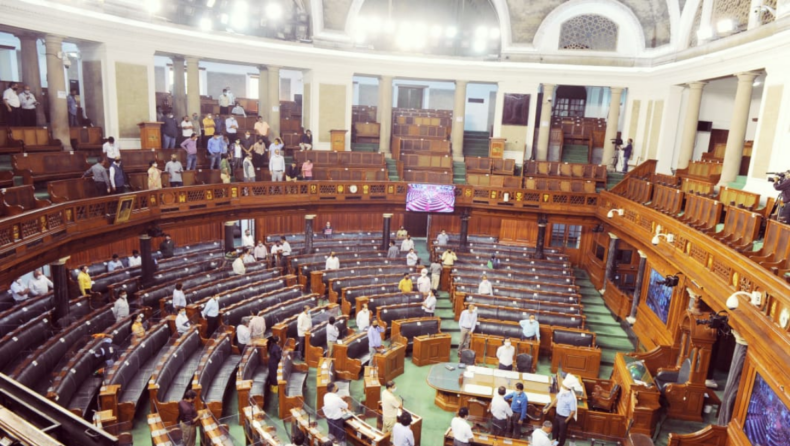The Monsoon Session of the Indian Parliament is a critical period during which lawmakers gather to discuss and deliberate on crucial legislative matters. However, the 2024 Monsoon Session has been marred by persistent logjams and disruptions due to the Manipur situation and the suspension of AAP’s Sanjay Singh. As both Houses reconvened on the 4th day of the session, the Opposition’s demand for a detailed statement from Prime Minister Narendra Modi has led to uproar and protests, stalling the parliamentary proceedings. This article aims to analyze the ongoing Monsoon Session and shed light on the complexities surrounding the Manipur situation while evaluating the impact of Opposition protests on the smooth functioning of the Parliament.
The Monsoon Session’s Significance
The Monsoon Session is a crucial period for the Indian Parliament, typically convened during the months of July and August. It plays a pivotal role in shaping the legislative agenda, discussing important bills, and holding the government accountable. The session provides an opportunity for robust debates, discussions, and the exchange of ideas among lawmakers.
The Manipur Situation: Background and Context
The Manipur situation has been a contentious issue, drawing the attention of the Opposition and fueling their demand for a detailed statement from Prime Minister Narendra Modi. The specific details of the situation and its implications need to be thoroughly examined to understand the intensity of the Opposition’s protests.
Manipur, a northeastern state in India, has been grappling with various socio-political challenges for decades. Insurgency, ethnic tensions, and demands for autonomy have been persistent issues in the region. The recent events leading up to the Monsoon Session have fueled the fire, resulting in widespread concern and unrest.
Opposition Protests and Uproar
The Opposition, led by parties like the Indian National Congress and others, has been relentless in its demand for a comprehensive statement from Prime Minister Modi regarding the Manipur situation. Their refusal to let the parliamentary proceedings continue until this demand is met has led to disruptions and uproar.
The Opposition’s primary responsibility is to hold the government accountable and ensure that the concerns of the people are heard and addressed. However, the relentless protests have hindered the legislative process and cast a shadow over the Monsoon Session

The Significance of the INDIA Alliance Meeting
The Indian National Developmental Inclusive Alliance (INDIA) is a coalition of political parties with common goals and objectives. To chart out a floor management strategy, members of the INDIA Alliance met at the office of Congress President Mallikarjun Kharge. This strategy is aimed at influencing the proceedings in the Upper House and gaining a stronger position during debates and discussions.
The floor management strategy is important as it seeks to unite various Opposition parties under a unified approach. By working together, the Opposition aims to strengthen its position and make its voice heard more effectively during the Monsoon Session.
Government’s Response and Strategy
The government’s response to the Opposition’s demands is crucial in determining the course of the Monsoon Session. The ruling party must engage in constructive dialogue and demonstrate its commitment to addressing the concerns surrounding the Manipur situation. A lack of communication and engagement can exacerbate the disruptions and prolong the impasse.
Additionally, the government must also be mindful of the larger legislative agenda and the importance of passing essential bills during the session. Balancing the need to address the Opposition’s concerns and maintaining parliamentary decorum is a delicate task for the ruling party.
Impact on Legislative Agenda
The disruptions and protests during the Monsoon Session have had a significant impact on the legislative agenda. Bills of paramount importance for the country’s progress and development have been put on hold due to the prevailing chaos.
Parliamentary sessions are critical for passing legislation that affects the lives of millions of citizens. The delays caused by the ongoing logjams can have far-reaching consequences, potentially hindering the implementation of crucial policies.
Public Perception and Media Coverage
The public’s perception of the ongoing Monsoon Session is influenced by the media coverage of the events. Media plays a crucial role in shaping public opinion and providing objective analysis of the developments in the Parliament.
The coverage of the Manipur situation, Opposition protests, and the government’s response can sway public sentiment. Media outlets must strive to present a balanced view of the situation to ensure that citizens are well-informed.
Way Forward
To break the impasse and facilitate constructive debates, all stakeholders must engage in open dialogue. The government should consider offering a detailed statement on the Manipur situation, addressing the Opposition’s concerns and demands.
The Opposition, in turn, must also be willing to cooperate and engage in parliamentary discussions without disrupting the proceedings. Both sides need to prioritize the larger interests of the nation and work towards finding common ground.
The ongoing Monsoon Session of the Indian Parliament has been marked by persistent logjams and disruptions due to the Manipur situation and Opposition protests. As lawmakers convene to address critical legislative matters, it is essential for all parties involved to prioritize constructive dialogue and open communication.
The Manipur situation requires careful consideration, and the Parliament must find a way to ensure that the voices of the people are heard and their concerns are addressed. Ultimately, the success of the Monsoon Session lies in the ability of all stakeholders to work together towards the betterment of the nation.












